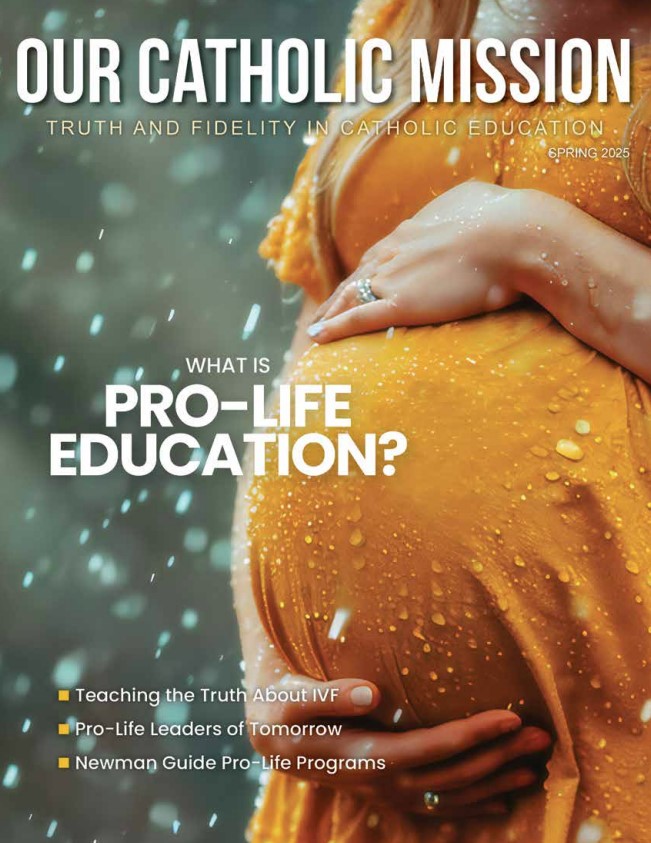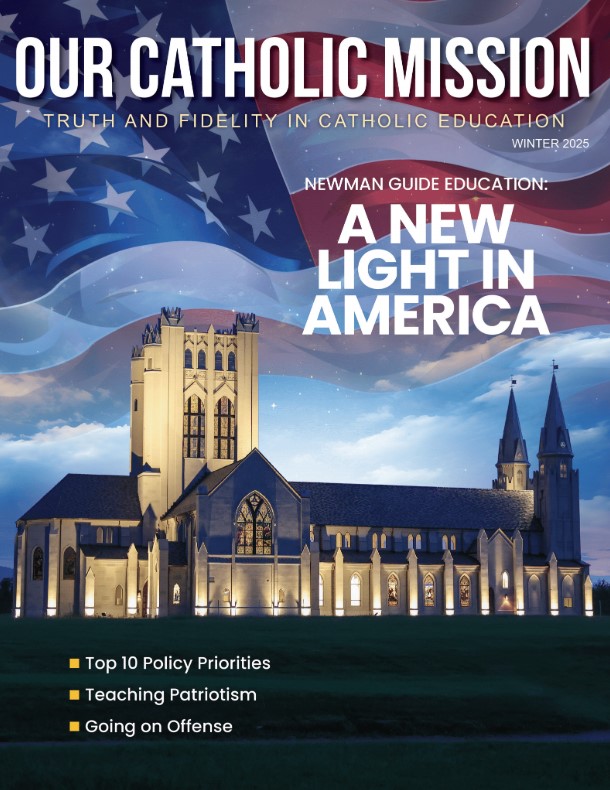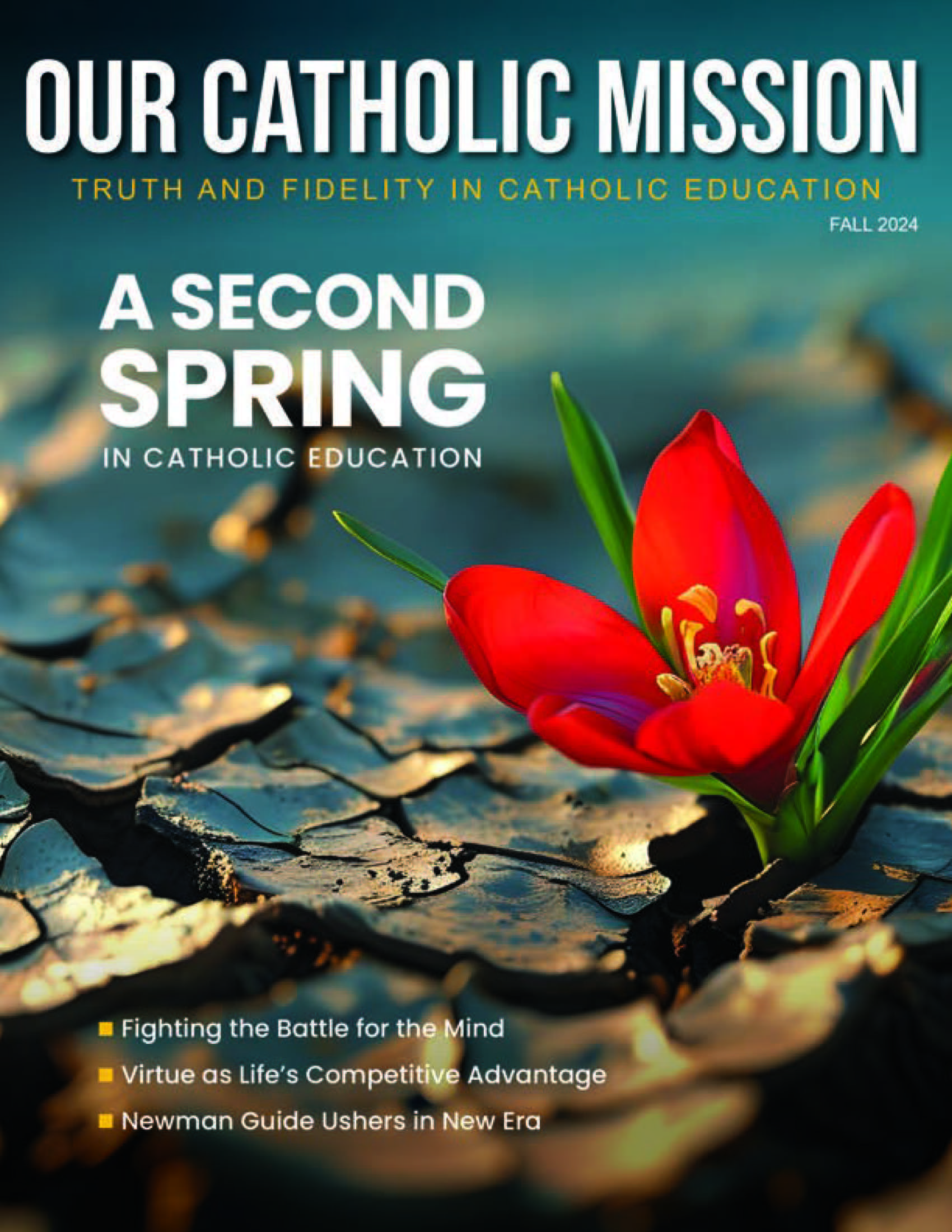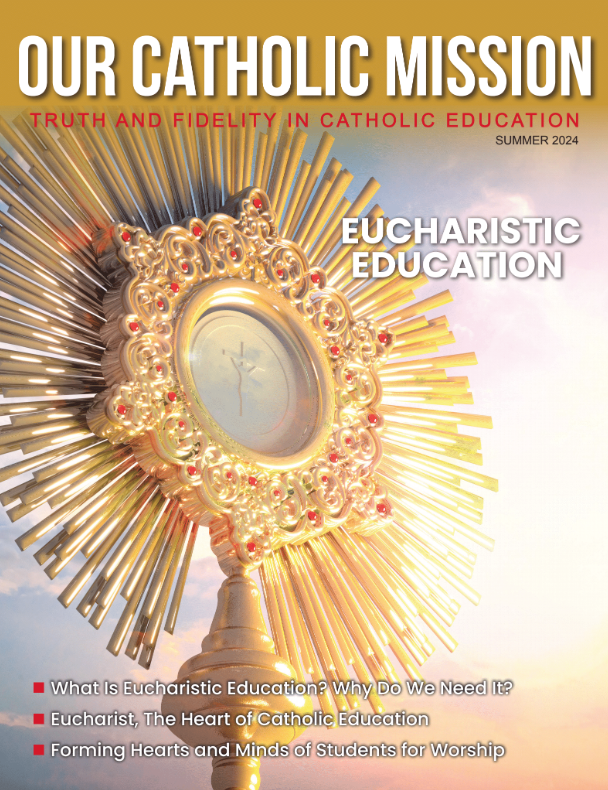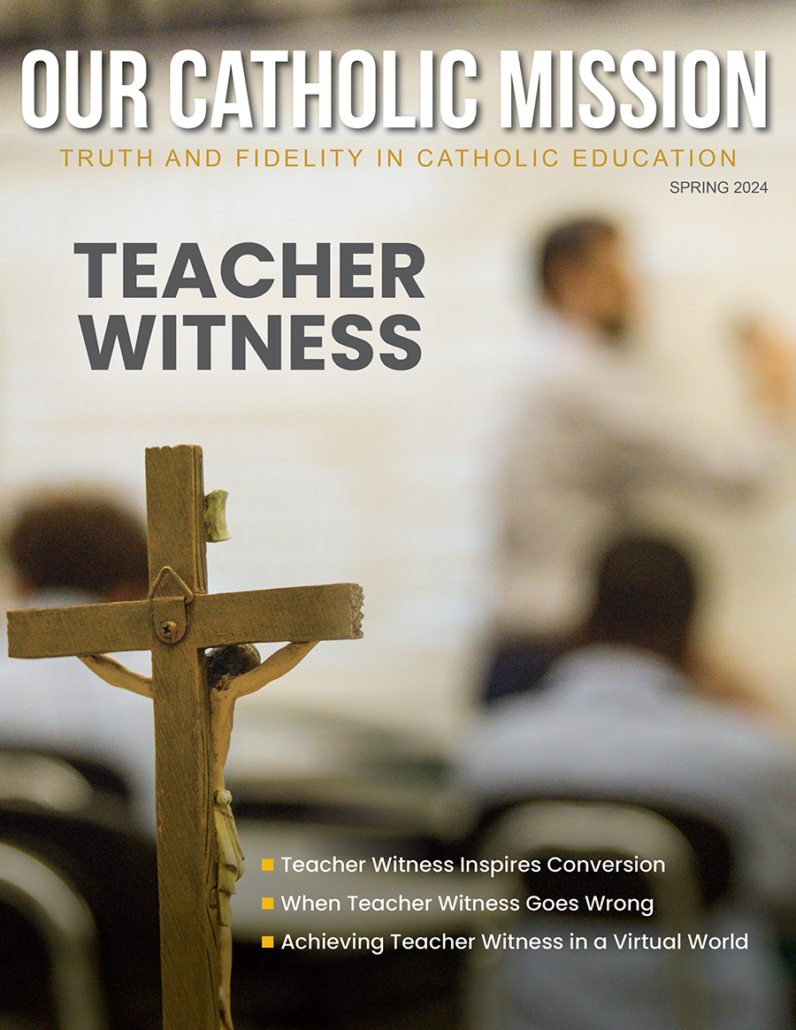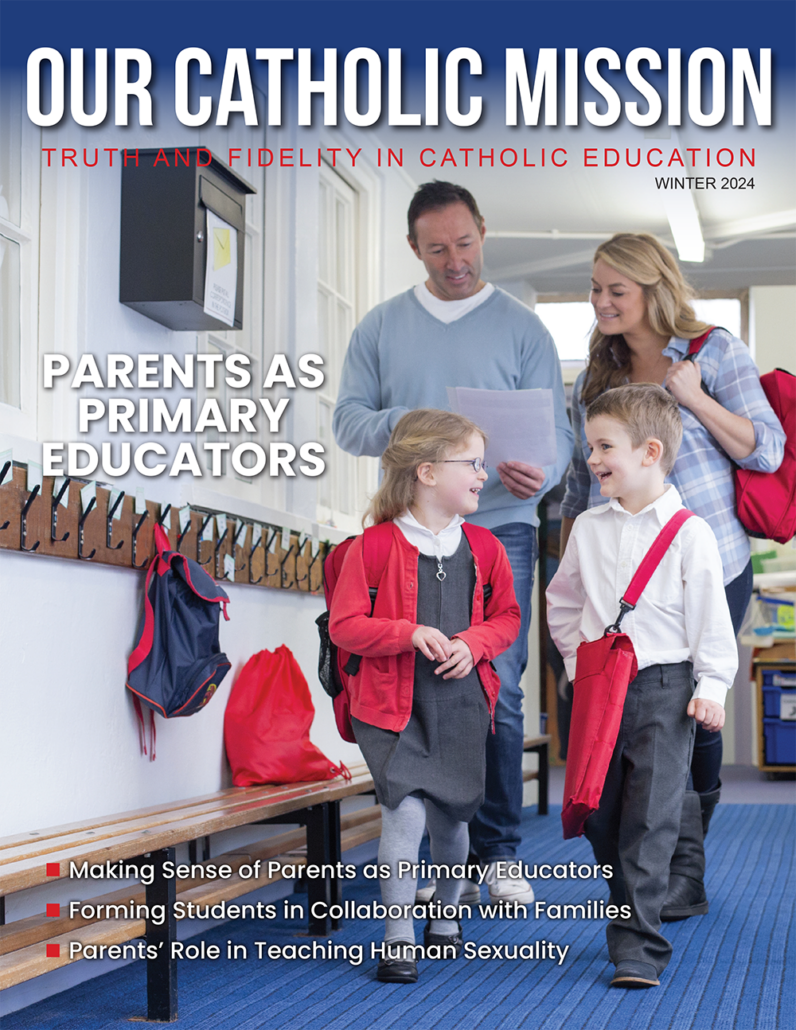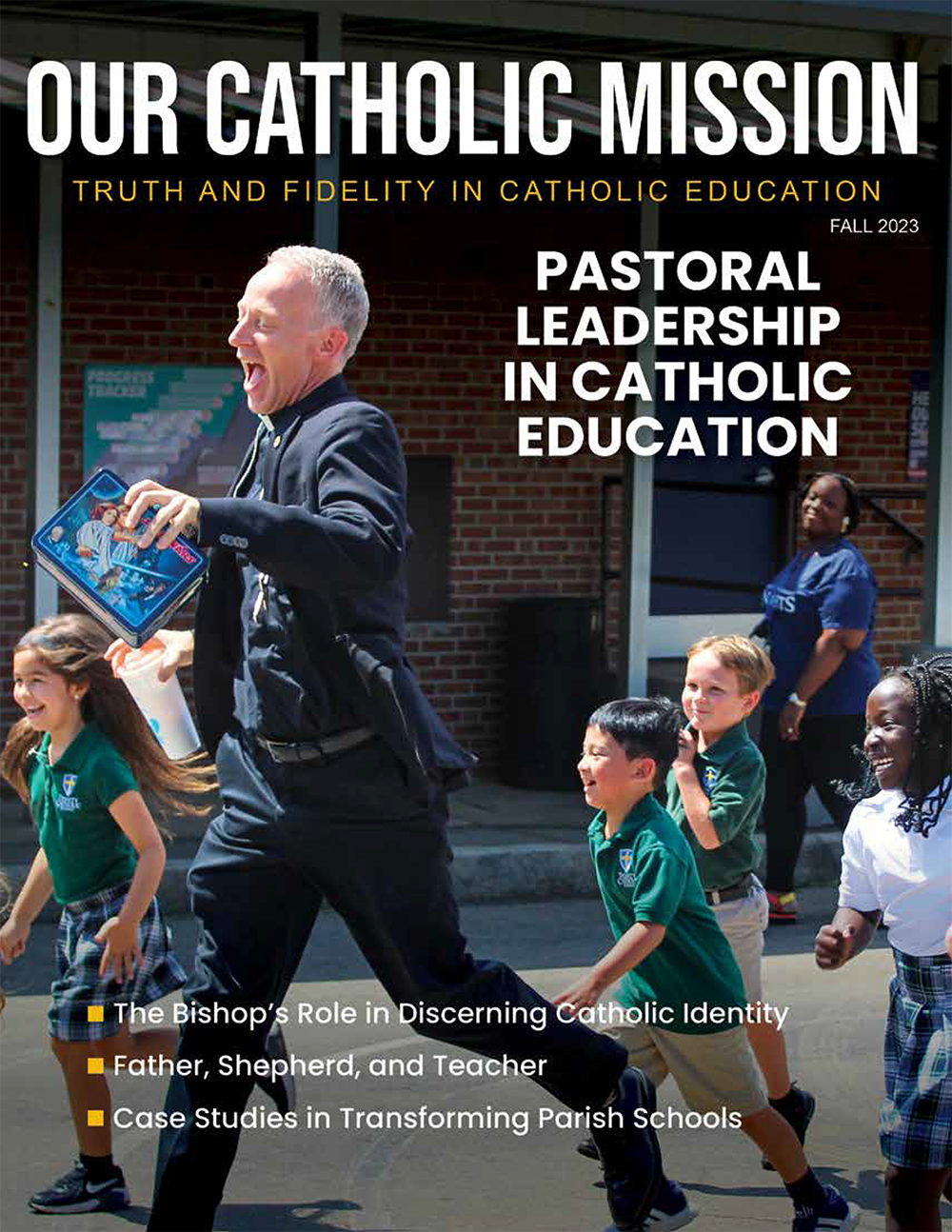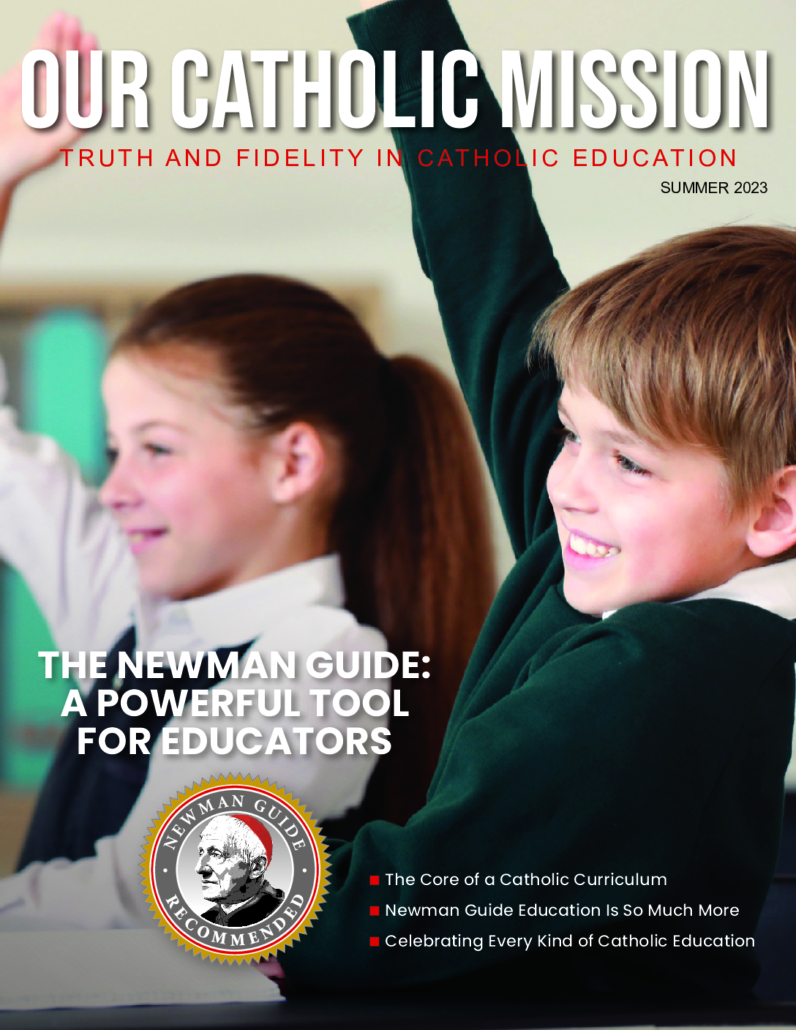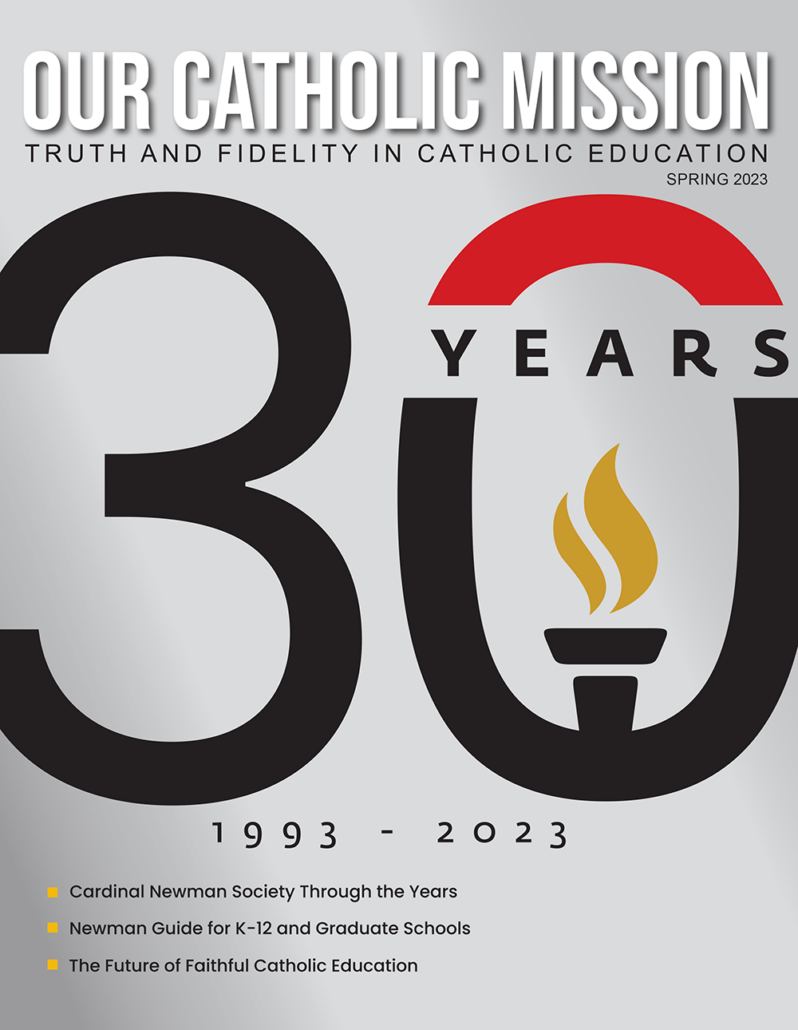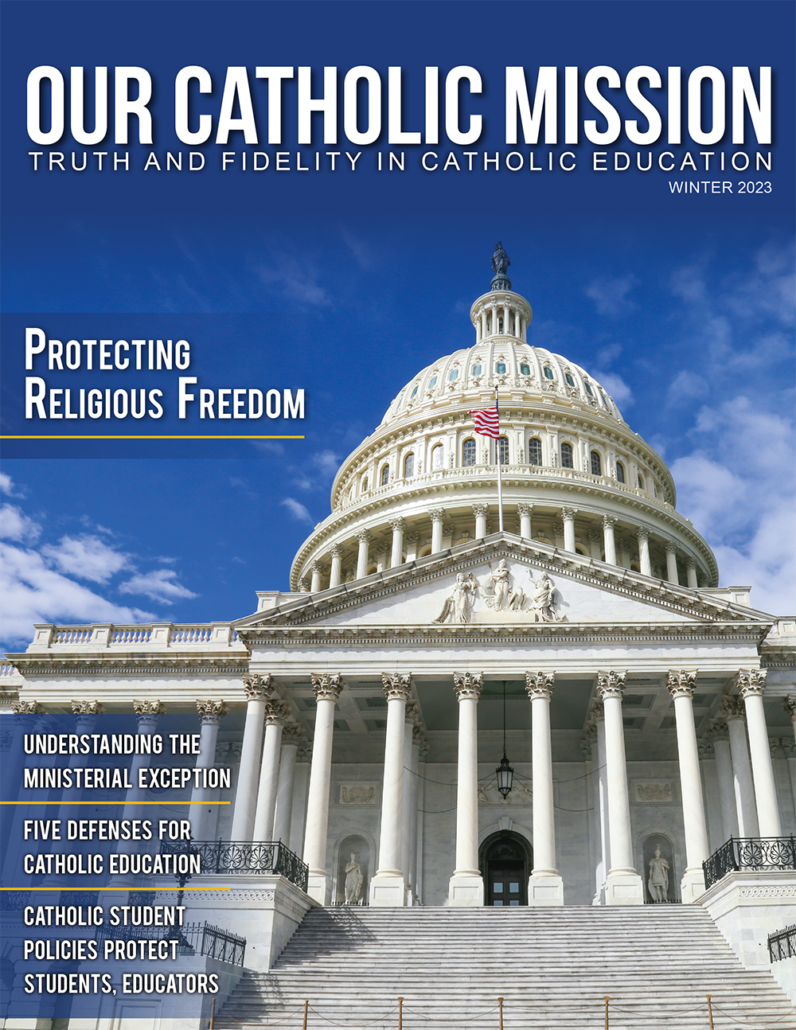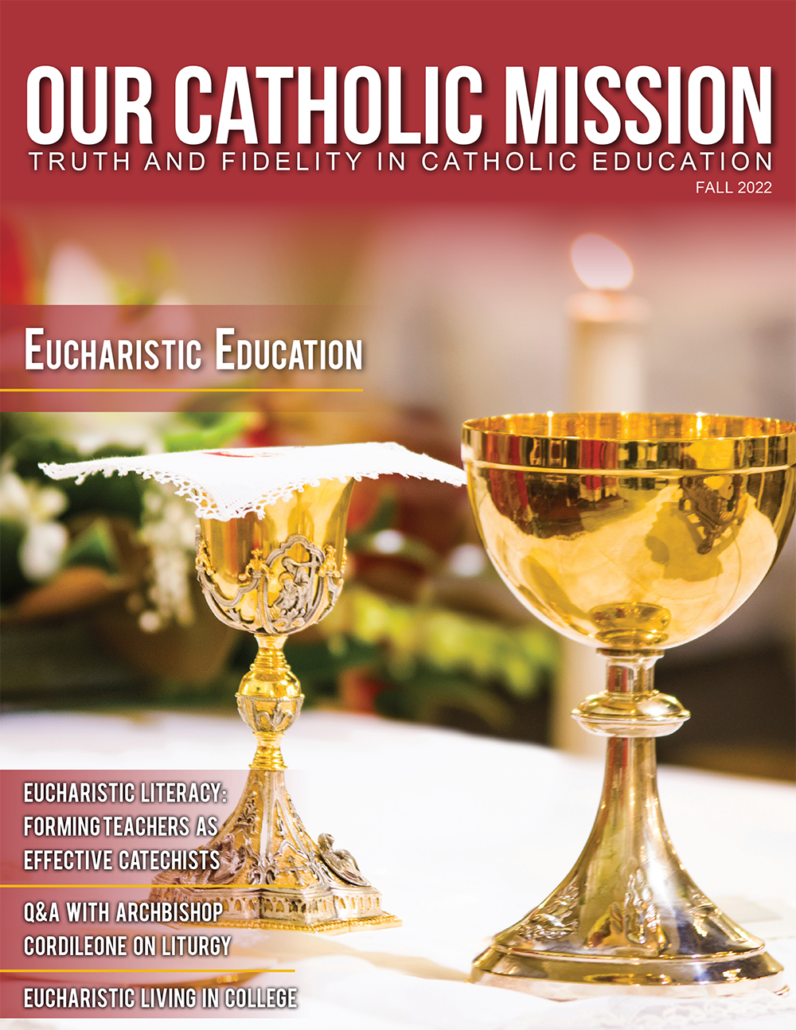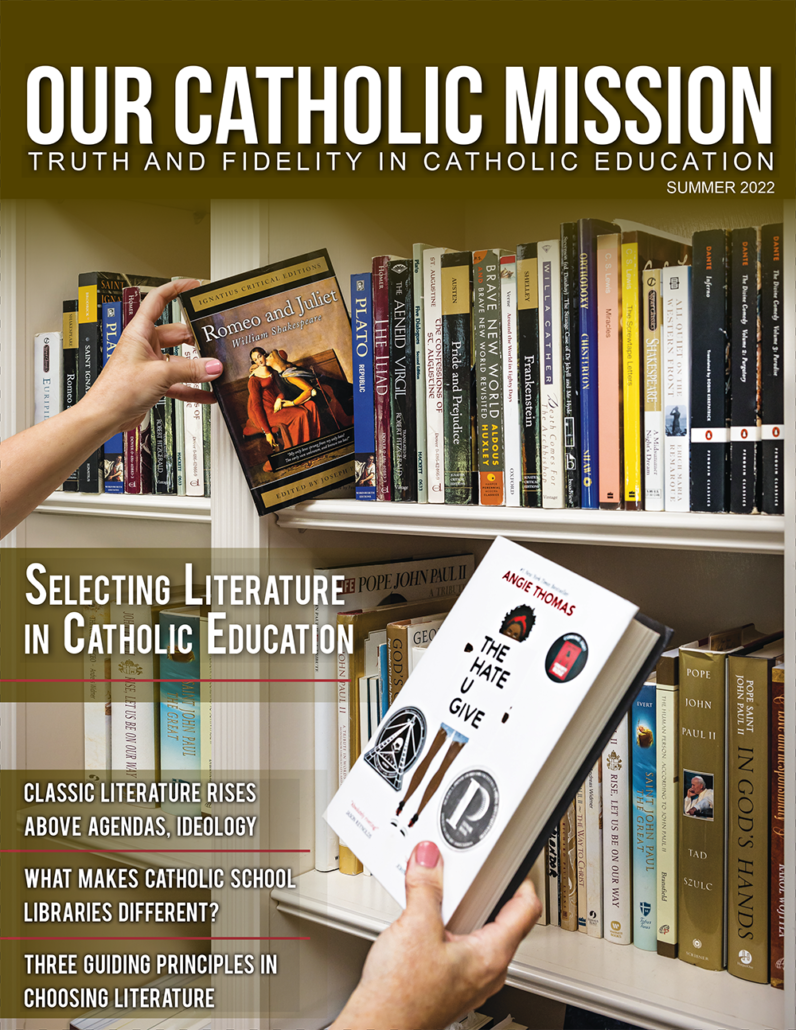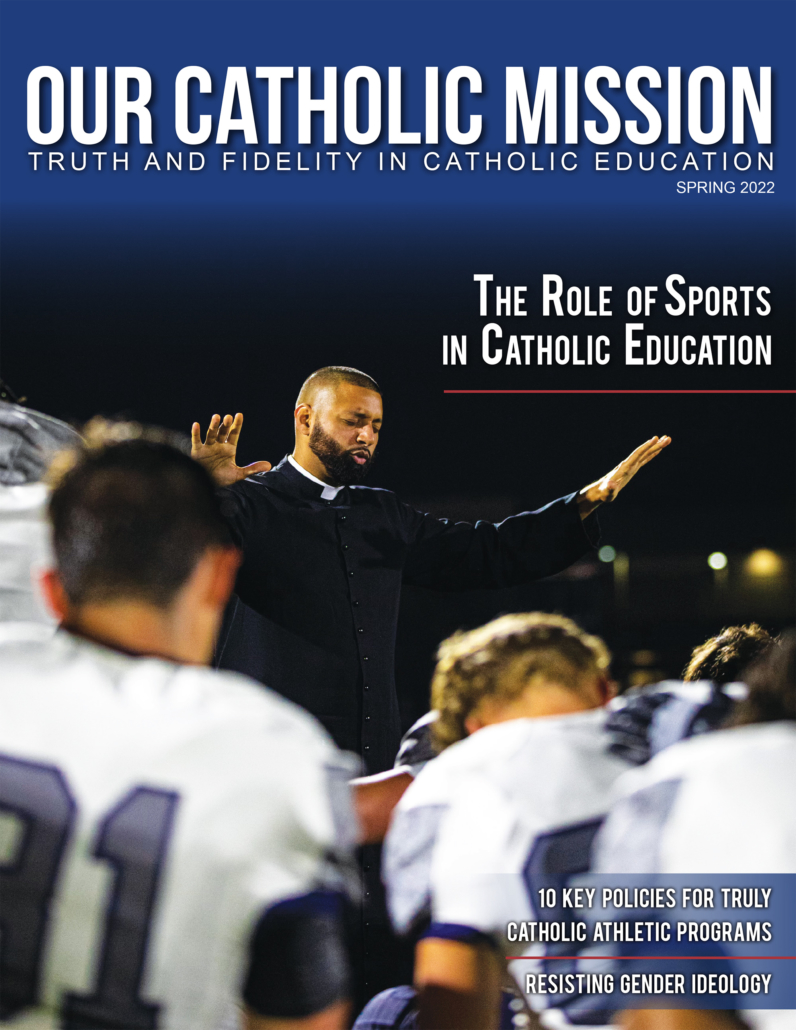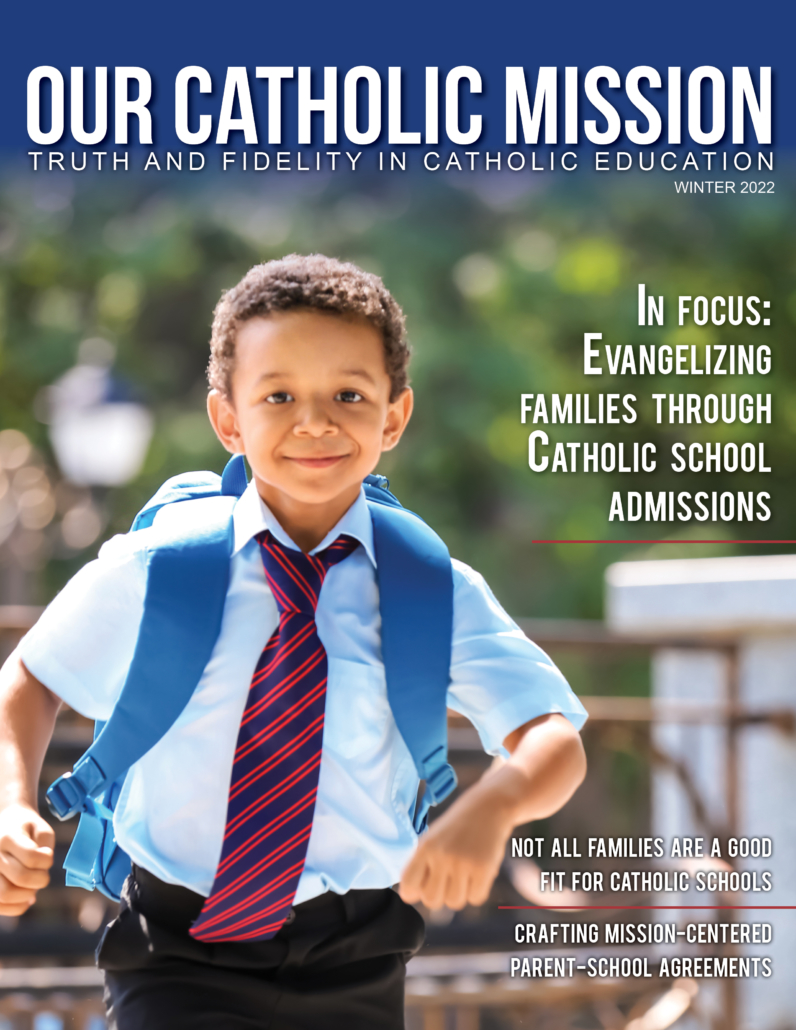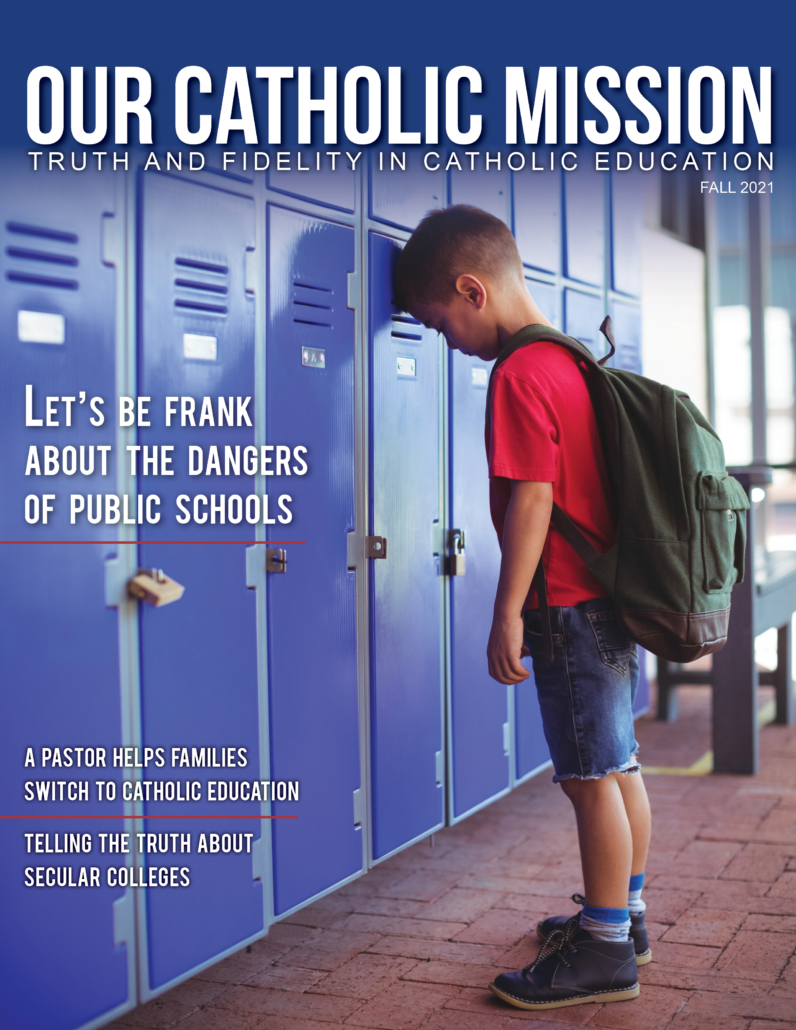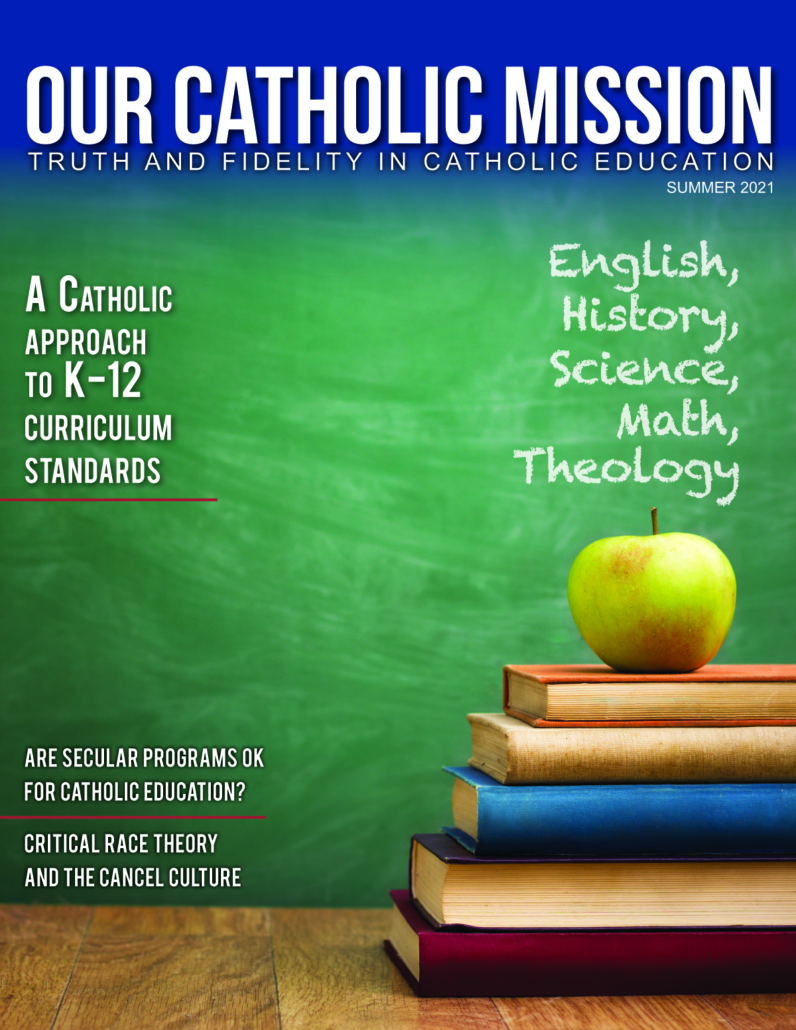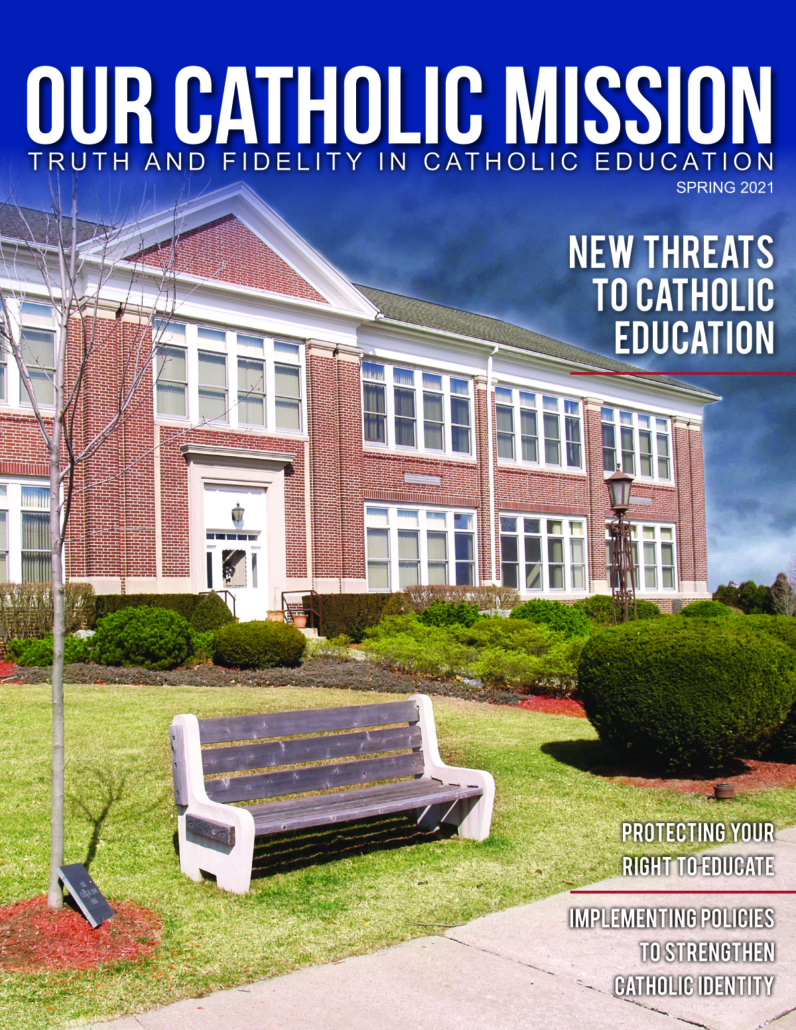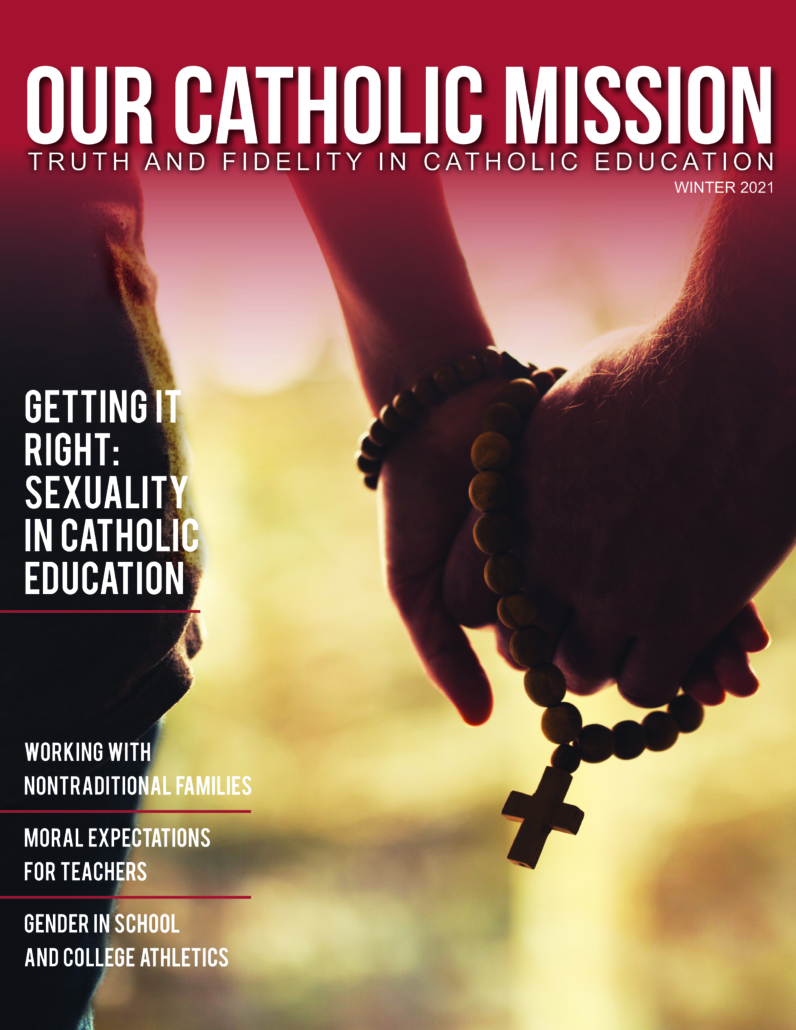Articles in this edition
A pro-life education is more than just attending an annual event or having a pro-life student club. Patrick Reilly, founder of The Cardinal Newman Society, outlines the four marks you should look for to ensure your school is imparting an understanding of human dignity and respect for human life.
Catholic educators must be public witnesses to the evils of IVF, enlightening their students about its dangers while standing firm and refusing to cooperate with IVF coverage in student and employee health plans.
Joseph Meaney, past president and senior fellow at The National Catholic Bioethics Center, shares hard truths about IVF amidst its political popularity and often well-meaning but misguided compassion for those struggling to conceive.
Newman Guide education is key to building a nation that is pro-life, pro-family, and pro-religious freedom. Educators at Newman Guide schools and colleges are forming the next generation of pro-life leaders. In this article, Kelly Salomon, vice president of Newman Guide Programs, introduces you to just a few.
Newman Guide Pro-Life Programs
The faithful Catholic elementary schools, secondary schools, and colleges recommended in The Newman Guide are proudly pro-life. These institutions integrate faith and science, teaching students to think critically and deepen their understanding of God, creation, and life. Here are some ways they display their pro-life witness.
Winter 2025 Edition
Articles in this edition
Catholic families today desperately need faithful Catholic education, and America needs the graduates of faithful Catholic education to renew our culture. The good news for our Church and America is that Newman Guide Recommended schools, colleges, and graduate programs are proliferating at a time when education is under intense scrutiny.
Top 10 U.S. Policy Priorities for Catholic Education
The Cardinal Newman Society submitted a list of policy priorities for Catholic education to the Trump administration’s transition team, key members of Congress, and Washington, D.C., policy experts. By acting on these policy priorities Catholic education can help safeguard its future.
Major General Patrick Henry Brady is widely recognized as the most highly decorated living veteran. He is also a faithful Catholic. In this article, Brady discusses the necessity for teaching patriotism and American exceptionalism in our Catholic schools.
For too long Catholic education in the United States has been stuck in a defensive posture, timidly defending its most basic rights while slowly secularizing. Instead, Kevin Roberts, president of The Heritage Foundation, says Catholic educators should use the next four years to aggressively expand their operations, deepen their commitment to Catholic teaching, and fortify themselves against future attacks.
Editor’s Note: A special “thank you” to Christendom College for the use of the Christ the King Chapel image.
Fall 2024 Edition
Articles in this edition
A Second Spring of Catholic Education
Patrick Reilly, founder of The Cardinal Newman Society, recently employed a phrase to describe the renewal of faithful Catholic education in schools and colleges—a “second spring.” This phrase was made famous by St. John Henry Newman, describing the return of Catholicism in England in 1852. Reilly parallels the growth of Newman Guide institutions with the rebirth and joy of spring but also warns of the inevitable storms accompanying spring’s arrival.
Fighting the Battle for the Mind
Monsignor James P. Shea, president of the University of Mary, says that Newman Guide education with its faithful Catholic understanding of the world and clarity about the deceptions that have confused most young people today, is best suited to helping students reject the lies of the Enemy and rebuild Catholic culture. After all, the mind is the arena of today’s spiritual warfare.
Virtue as Life’s Competitive Advantage
Employers are starting to realize that what is most valuable about their employees is not their hard skills but something more fundamental. These skills are a set of habits for thinking, acting, and feeling. Dr. Andrew Abela, dean of the Busch School of Business at the Catholic University of America, explains these are the virtues: the superhabits that lead to a successful life.
Newman Guide Ushers in New Era of Catholic Education
In the early centuries, Catholic monasteries were the hubs of cultural transformation, and communities were built around them. Today, Dr. Marcus Peters, host of Ave Maria in the Afternoon, says that it’s the faithful Catholic schools and colleges appearing on the Newman Guide that are the new hubs transforming our culture.
Summer 2024 Edition
Articles in this edition
What Is Eucharistic Education? Why Do We Need It?
David G. Bonagura, Jr., the Cardinal Newman Society Fellow for Eucharistic Education, explains how the Eucharist should be the center of a school’s life, informing everything it does, including its academic curriculum, formational programming, and extracurricular activities.
Eucharist, The Heart of Catholic Education
Randall Smith, the Cardinal Newman Society Fellow for Eucharistic Liturgy, shows how an effective Catholic education means the integration of knowledge bridging the divide between the natural sciences and the humanities. Smith uses the lessons etched in the architectural framework of the Cathedral of Our Lady in Chartres, France, to display this integration and communicate a profound message about the Eucharist.
Forming Hearts and Minds of Students for Worship
Father Jonathan Duncan, Cardinal Newman Society Fellow for Eucharistic Devotion, shows that to understand the place of the Eucharist in Catholic education, we must first understand and contemplate the four elements of worship: worth, training, method, and culmination.
Spring 2024 Edition
Articles in this edition
Teacher Witness Inspires Conversion
Anabelle Pearson described herself as an atheist leading up to her years attending Holy Rosary Academy in Anchorage, Alaska. Through the witness of faithful Catholic educators, she is entering the Catholic Church in 2024 and now says God is not a crutch to get through life but the reason she has life!
When Teacher Witness Goes Wrong
Catholic education speaks as much by witness as by classroom instruction. Therefore, it is out of concern for truth and the formation of students that Catholic education leaders must discipline and sometimes even remove teachers when they lead students astray. To not do so would be to give moral equivalence to error.
Achieving Teacher Witness in a Virtual World
Does a virtual world change how we teach? Ann Brodeur, from Catholic Distance University, says that all good teaching, whether in person or online, is first personal and relational. Brodeur outlines the seven basic habits of intentional (online) learning. These can help any teacher regardless of the setting.
Winter 2023 Edition
Articles in this edition
Making Sense of Parents as Primary Educators
Parents must take full responsibility for the education of their children and the choice of whether to employ professionals in that task—and which ones.
Catholic educators, in service to parents, should fully support this role and help parents know and choose the special value of faithful Catholic education.
Forming Students in Collaboration with Families
There is great benefit for Catholic educators to focus on the family’s unique role in education and evangelization and to explore how they can best assist them.
Dan Guernsey, a 30-year veteran of Catholic schools, shares insightful ideas on how one could achieve this.
Parents’ Role in Teaching Human Sexuality
Read about the four guiding principles Catholic educators should abide by when teaching human sexuality.
Supporting Homeschool Families
To complete the renewal of Catholic education, it will take a pooling of assets. Find out how educators can support the growing demographic of homeschooling families.
Fall 2023 Edition
Articles in this edition
The Bishop’s Role in Discerning Catholic Identity
Read about the responsibilities and indispensable role of the bishop in discerning Catholic identity in our schools, homeschools, and colleges.
Bishop Thomas A. Daly, of Spokane, WA. is the chairman of the USCCB Committee on Catholic Education. In this article, he shares three images of bishops that highlight their role in ensuring the mission of Catholic education. Bishop Daly also alerts his fellow bishops to keep watch over their flock when threats from gender ideology and secularism threaten the souls of children.
Priests Are Needed in Faithful Catholic Education
Father Peter M.J. Stravinskas, president of the Catholic Education Foundation, reminds us of the importance of the Catholic school in the life of the Church, particularly as a vehicle of the new evangelization. However, for schools to be vibrant, priests must be champions of Catholic education. Stravinskas goes on to share additional insight from one of the Church’s newest saints—St. John Henry Newman—a lifelong educator.
Case Studies in Transforming Parish Schools
Two case studies from two different parts of the country show how a parish priest undertook the difficult task of transforming their Catholic parochial school, recognizing that amidst the many challenges the school ultimately belongs to Jesus.
Summer 2023 Edition
Articles in this edition
The Core of a Catholic Curriculum
As the lead evaluator of Newman Guide recognition, Dr. Denise Donohue outlines what to look for in a Catholic curriculum and how the curriculum should not only educate but draw students into the heart of the Church.
Newman Guide Education Is So Much More
To achieve Newman Guide recognition a school or college does not just have a better academic curriculum, instead, it has a better and more complete understanding of the human person. This enables them to see students as a unity of mind, body, and spirit.
Celebrating Every Kind of Catholic Education
As Catholic education keeps getting better, we celebrate the very best regardless of form (independent, parochial, diocesan, home). Case in point, we recently awarded Holy Angels Academy in Louisville, Kentucky, Newman Guide Recognition as we helped celebrate their 50th anniversary.
Spring 2023 Edition
Articles in this edition
The Future of Faithful Catholic Education
Here are five objectives that Catholic education leaders can keep in mind as they move toward fulfilling the call for courageous renewal.
CNS Launches Newman Guide Recognition for Schools, Graduate Programs
The Newman Guide has helped Catholic families find solid Catholic colleges since 2007. Inspired by this success, we are extending the Newman Guide to include faithful Catholic elementary, secondary, and graduate school options. Read how this ensures your family has a pathway to a seamless, faithful Catholic education.
The Cardinal Newman Society Through the Years
Since 1993, The Cardinal Newman Society has led the growing movement for renewal of faithful Catholic education. Check out some of our past victories and the many initiatives we are pursuing to ensure Catholic education upholds its sacred mission.
Winter 2023 Edition
Articles in this edition
Understanding the Ministerial Exception
The term “ministerial exception” has become common parlance for Catholic educators. But there is much about the exception that is misunderstood and remains undetermined. Find out ways your school or college could increase the likelihood of applying this exception.
Five Defenses for Catholic Education
You’re going to court—it’s almost inevitable. Do you know the five key defenses for Catholic education? Individually, they may not be enough, but together they offer powerful protection.
Catholic Student Policies Protect Students, Educators
One way to counter the ever-pressing culture is to produce and implement truly Catholic policies related to student formation and conduct. This will not only avoid conflict and lawsuits but give your school or college credibility when claiming religious freedom.
Fall 2022 Edition
Articles in this edition
Eucharistic Literacy: Forming Teachers as Effective Catechists
Eucharistic literacy among students begins with hiring teachers who are literate in the Church’s teaching on the Sacrament of sacraments. But just as ongoing formation is needed in all subjects, so is catechetical formation for all teachers.
Eucharistic Liturgy: A Q & A with Archbishop Cordileone
In this discussion with Archbishop Cordileone of the Archdiocese of San Francisco, he shares how catechesis is more than what is taught with words but is especially how worship is conducted.
Eucharistic Devotion: How to Promote Eucharistic Devotion at Your School
Here are five ways this Principal promotes Eucharistic devotion at his K-12 school.
At college, young people are encouraged to do many things, but at faithful Catholic colleges, students learn how to live a Eucharistic life. What does a Eucharistic life entail? Find out more and share with families of school-age children.
This is a special edition of Our Catholic Mission produced in support of the United States Bishop’s three-year Eucharistic Revival.
Please click on the Eucharistic Education tab at the top of The Cardinal Newman Society’s website. Share the url with your friends and fellow parishioners, encouraging them to join the Eucharistic Task Force or submit a project.
Summer 2022 Edition
Articles in this edition
Classic Literature Rises Above Agendas, Ideology
Dan Guernsey, education policy editor and senior fellow at The Cardinal Newman Society shares how choosing the right literature can be an antidote for today’s pop culture. He also provides a list of do’s and don’ts to ensure that through literature, you are providing a compelling Catholic witness.
What Makes Catholic School Libraries Different?
A Catholic school library is different because the mission of a Catholic school is different. Rather than shy away from this, it is something to embrace, a distinguishing characteristic.
Three Guiding Principles in Choosing Literature
We have assembled Policy Standards on Literature and the Arts in Catholic Education recognizing that literature is an essential tool in the formation of a student’s mind, body, and spirit. If you’re unsure of how to choose literature, it’s as simple as 1-2-3.
Spring 2022 Edition
Articles in this edition
Sport Is More Than a Game for Catholic Schools
Sports are an extension of a Catholic school’s mission and should be seen as both evangelical and formative.
10 Ways to Strengthen Athletics in Catholic Education
(Bonus: Anticipated Questions One Might Encounter)
This list is drawn from The Cardinal Newman Society’s “Policy Standards on Formation of the Human Person in Catholic School and College Sports.” It can serve as a guide to ensure sport achieves its true potential.
Catholic Educators Rise to Defend Women’s Sports
Faithful Cardinal Newman Guide colleges joined other religious colleges in standing firm against gender ideology and ultimately in defense of women’s sports by persuading the National Collegiate Athletic Association (NCAA) to include broad protection for the mission of religious colleges in the Association’s new constitution.
Winter 2022 Edition
Articles in this edition
Evangelizing Families Through Catholic School Admissions
Building and protecting a Catholic school’s community—which in itself is essential to the school’s task of forming young people for Christian communion with others and with God—should be a central concern in admissions decisions.
Handling the Tough Cases: Admissions Policies for Nontraditional Families
Dr. Dan Guernsey, education policy editor and senior fellow, explores why some families are not a good fit for Catholic schools, and others require special consideration. He provides guidance on how to treat individual family situations with compassion and courage, for the good of everyone involved.
Crafting Mission-Centered Parent-School Agreements
Strong parent-school agreements can help Catholic families and educators start off on the same page—committed to the integral formation of students for this life and the one to come—while ensuring that parents are well-informed of school policies.
Fall 2021 Edition
Articles in this edition
A Pastor Saves His Flock by Catholic Education
“We need to do whatever we can to help parents get their kids out of these corrupt government-run schools,” Father John De Celles tells The Cardinal Newman Society.
Time for an Exodus from Public Schools?
Two expert scholars, Mary Rice Hasson, JD, and Theresa Farnan, PhD, argue that today is a “watershed” moment for Catholics to explore the state of public education. They urge Catholic educators to make available a wide variety of Catholic education options.
Facing Hard Truths About Secular Colleges
Patrick Reilly, president of The Cardinal Newman Society, reveals why the Ivy League institutions—and all secular colleges—aren’t what they’re made out to be. Since the founding of the Newman Society more than 28 years ago, Patrick has been alerting families and education leaders to the problems in secular (and secularized Catholic) higher education.
Summer 2021 Edition
Articles in this edition
Catholic educators can and should be teaching about race and human dignity, but Critical Race Theory is ideological and divisive and not appropriate to Catholic education.
Catholic Curriculum Standards: Faithful to the Core
Today, at least 28 diocesan school systems and many other Catholic schools across the United States—serving more than 270,000 students—use The Cardinal Newman Society’s Catholic Curriculum Standards to replace or supplement their existing diocesan standards.
Secular Resources Can Be Dangerous to Catholic Education
“Catholic educators teach and do more,” write the Newman Society’s Dr. Denise Donohue and Dr. Dan Guernsey. “This means they must ask more of any material or program imported into the educational environment and be ready to heavily adapt it toward a greater end.” They also must recognize that “some resources will be woefully insufficient, and others may have elements that actually work against the Catholic mission.”
Spring 2021 Edition
Articles in this edition
New Threats to Catholic Education
In just the first months of the Biden administration, Catholic educators have been confronted by serious threats to their freedom to teach and witness to the Catholic faith. In particular, the Biden administration seems determined to force Catholic schools and colleges to embrace gender ideology or close their doors.
Protecting Your Right to Educate
Undertaking a Mission Audit—and implementing strong Catholic standards like those provided by the Newman Society—will go a long way in helping Catholic schools strengthen their mission and defend against legal threats. Just as a general audit helps an organization understand its financial soundness, a Mission Audit will help a religious organization understand how its religious convictions affect its work and how these convictions may face conflict.
Implementing Policies to Strengthen Catholic Identity
The time is now for Catholic educators to ensure that all policies are in order and all practices consistently uphold a strong Catholic identity. Policies should clearly explain moral expectations for employees and students and show how they are rooted in Catholic teaching.
Winter 2021 Edition
Articles in this edition
Getting it Right: Sexuality in Catholic Education
Increasingly, Catholic dioceses, schools and colleges are embroiled in controversy and conflict over sexual matters. To prevent such problems, these situations require pastoral sensitivity and the guidance of clear institutional policies that both uphold and explain the obligations of faithful Catholic education.
Working with Nontraditional Families
Disagreement in the Church regarding nontraditional families—the growing variety of home situations beyond a faithfully Catholic family with a married mother and father—may leave schools more vulnerable to discrimination lawsuits and to vilification by the media, politicians and social activists.
Moral Expectations for Teachers
Moral standards should apply to educators in every subject area, not just religion teachers or theology professors.
Gender in School and College Athletics
“Gender theory is a distortion of the full development of a person and attacks the integrity of the body… It works against a Catholic understanding of athletics and the good of the person and so has no claim on Catholic programing.”
Selected Newman Society resources for Catholic educators and families
Critical Race Theory and Cancel Culture
- Background on Critical Race Theory and Critical Theory for Catholic Educators
- Catholic Education’s Call in the Face of ‘Cancel Culture’
Standards for Christian Anthropology
- K-8 standards for transmitting a vision of the human person according to God’s loving design and St. John Paul’s teachings on the human person
- Questions and answers on Christian Anthropology Standards
- Webinar introducing Christian Anthropology Standards
Catholic Curriculum Standards
- Authentically Catholic standards in English, history, mathematics, and scientific topics for grades K-12
- Educating to Truth, Beauty and Goodness
- Webinar on implementing the Catholic Curriculum Standards
- Webinar on how truth, beauty and goodness are incorporated in Catholic Curriculum Standards
Other topics related to curriculum
- Policy Standards on Secular Academic Materials and Program in Catholic Education
- Procedure and Checklist for the Evaluation and Use of Secular Materials and Programs in Catholic Education
- Analysis of the Habits of Mind Program
- Analysis of Advanced Placement Courses
- Analysis of International Baccalaureate Program
- Analysis of Secular Character Development Programs and Materials
- Policy Standards on Literature and the Arts in Catholic Education
- Maintaining Catholic Identity in Distance Learning Instruction
Human sexuality policies
- Policy Standards on Human Sexuality in Catholic Education
- Working with Nontraditional Families in Catholic Schools
- Not All Families Are a Good Fit for Catholic Schools
- Protecting the Human Person: Gender Issues in Catholic School and College Sports
- Fighting Pornography on Catholic College Campuses
Moral standards for employees
- All Employees Matter in the Mission of Catholic Education
- Community Matters to a Catholic School’s Mission
- Faith and Morals Language in Catholic School Teacher Employment Documents: Best Practices Brief
- Morality Language in Catholic School Teacher Employment Documents: Exemplar Statements, Language, and Contract Samples
Legal issues
- Key Points on Supreme Court’s Espinoza Ruling on Public Benefits for Catholic Education
- Key Points on Supreme Court’s Our Lady of Guadalupe Ruling on Ministerial Exception
- Key Points on Supreme Court’s Bostock Ruling on Sex Discrimination
- Amicus brief to 7th Circuit Court of Appeals regarding ministerial exception


